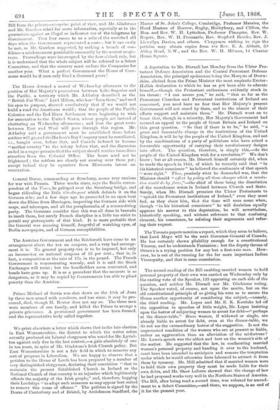A deputation to Mr. Disraeli last Monday from the Ulster
Pro- testant Defence Association and the Central Protestant Defence Association, the principal spokesman being the Marquis of Down- shire, elicited from the Prime Minister the most emphatic Exeter- Hellish declaration to which he has as yet been able to educate himself,—though the Protestant enthusiasm evidently stuck in his throat : "I can assure you," he said, " that so far as the Protestant Churches and Protestant institutions of Ireland are concerned, you need have no fear that Her Majesty's present Government will not stand by them, and to the utmost of their efforts support and maintain them." Mr. Disraeli went on to boast that, though in a minority, Her Majesty's Government had secured an appeal to the people of Great Britain and Ireland on this great question. "So that if there is to be," he said, "a great and lamentable change in the institutions of the United Kingdom, it will be by the people of the United Kingdom, and not by the machinations of a party of politicians who have seized a favourable opportunity of carrying their revolutionary designs into effect. The question, therefore, is simply this,—do the people of the United Kingdom wish for a revolution ?" We don't know ; but at all events, Mr. Disraeli himself certainly did, when he made the speech in 1844, of which he recently said that "in his historical conscience" he believed the sentiments of that speech "were right." Then, precisely what he demanded was, that the Minister should "effect by policy all those changes which a revolu- tion would do by force,"—the chief of these being the dissolution of the unwelcome union in Ireland between Church and State. Surely, when Mr. Disraeli promises the Ulster Protestants to "uphold the Protestant institutions of Ireland," even they must feel, as they cheer him, that the time will soon come when, though "in his historical conscience" he will doubtless equally approve his answer to this deputation, he will nevertheless, historically speaking, and without reference to that confusing element, his conscience, be refuting their arguments and refus- ing their request.






























 Previous page
Previous page